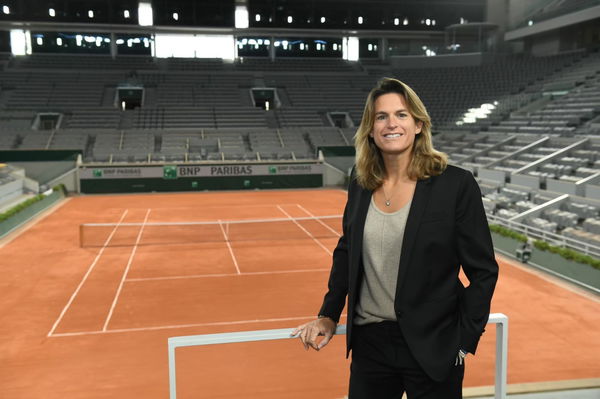

In the realm of tennis, gender dynamics persist as a contentious topic, casting shadows over the ongoing French Open. This year’s tournament scheduling has reignited the perennial debate, with voices demanding parity and fairness. Amelie Mauresmo, the tournament director, has defended the decisions, though criticism continues to pour in from all corners, highlighting the persistent challenges faced in achieving equality within the sport.
For over two seasons, female tennis players have been striving to secure prime-time slots for their matches. In the past two editions, only one women’s match was scheduled during the prime-time slot. Despite assurances from organizers to improve the situation this year, the scenario at Roland Garros worsened. Out of the 11 prime-time slots available, not a single one was allocated to women’s matches, exacerbating the existing disparity.
The discrimination faced by female tennis players not only received flak from the players themselves but also from the WTA. “The generation and depth of talent we are currently witnessing in the sport is incredible,” the governing body of women’s tennis said in a statement. “Fans want to see the excitement and thrill of women’s tennis on the biggest stages and in premium time slots. To continue building the value of our combined product, a balanced match schedule that features both the best in men’s and women’s tennis is critical.“
ADVERTISEMENT
Article continues below this ad
Amidst the backlash, Amelie Mauresmo addressed the issue, speaking to the Tennis Channel. The French boss reiterated her earlier stance and justified the scheduling. She explained that men’s matches are scheduled at night due to their longer duration. She emphasized the challenge of starting night matches earlier to accommodate women’s games, citing concerns about crowd attendance. Amelie Mauresmo’s recent remarks echo her previous statements on the issue.
Amelie Mauresmo says on Tennis Channel they can't do the night session with an earlier start because people work late in Paris so the crowd would be empty early on.
Says the potential length is why they went with only men's matches, as she's stated the last couple years.
— Tennis Updates (@TennisUpdates24) June 8, 2024
Last year, when Jessica Pegula voiced concerns about late-night matches, Mauresmo highlighted that some high-profile female players were reluctant to play at night due to various reasons. “I just also want to say that some of the high-profile players, that are the women’s players I’m talking about, that would be our choices to put in the night matches, are not really keen to go at night and are having different requests.” This perspective suggests that the debate over scheduling at Roland Garros involves multiple factors, including player preferences and logistical considerations.
Well, this is not the first time the debate of gender disparity has emerged in the ongoing French Open.
ADVERTISEMENT
Article continues below this ad
Rennae Stubbs slammed the Tennis Channel for gender disparity!
In the ongoing French Open, Alex de Minaur made history as the first Australian male player to reach the quarterfinals since 2004. However, the Tennis Channel mistakenly omitted the word “male” in their coverage. This inaccurately claimed that he was the first Australian since Lleyton Hewitt to achieve this feat.
This oversight did not sit well with former Australian tennis star Rennae Stubbs, who quickly pointed out the error. Taking to Twitter, Rennae congratulated De Minaur on his victory but also called out the Tennis Channel for their mistake. She highlighted that Samantha Stosur, an Australian female player, had reached the Roland Garros quarterfinals multiple times since 2004.
ADVERTISEMENT
Article continues below this ad
Stubbs has been vocal about such disparities in the past as well. In early 2023, she called out the Tennis Channel over issues related to commentators. During the simultaneously played Qatar Open and ABN AMRO Open, Stubbs noted double standards in reporting. She observed that while the finals of the Women’s Qatar Open had only one commentator, the men’s semifinal at ABN AMRO had two.
While nothing can be done about the scheduling of the matches anymore this season, it will be interesting to see if the organizers can overcome these challenges and schedule matches fairly in future editions of the French Open.
ADVERTISEMENT
ADVERTISEMENT
ADVERTISEMENT
ADVERTISEMENT

